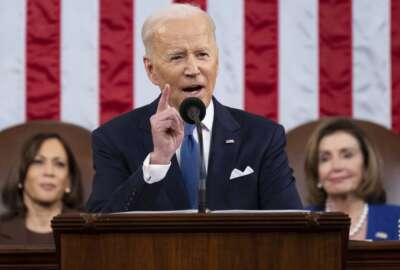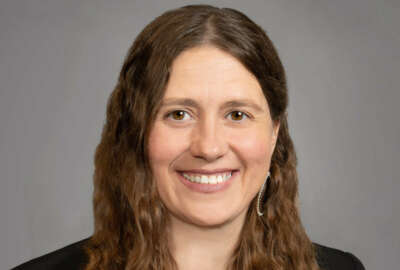Hubbard Radio Washington DC, LLC. All rights reserved. This website is not intended for users located within the European Economic Area.
Lobbyists sign open letter asking to reopen Capitol to the public
The Capitol and its environs have been mostly closed to visitors since - well, you know. Tourists, Girl Scout troops, and Lions Club presidents aren't the only ...
Best listening experience is on Chrome, Firefox or Safari. Subscribe to Federal Drive’s daily audio interviews on Apple Podcasts or PodcastOne.
The Capitol and its environs have been mostly closed to visitors since – well, you know. Tourists, Girl Scout troops, and Lions Club presidents aren’t the only ones who want the Capitol opened back up, so do lobbyists. They’re circulating an open letter trying to nudge members to get back to normal. For more details, the Chairman of the board of the National Institute for Lobbying and Ethics, Paul Miller spoke to the the Federal Drive with Tom Temin.
Interview transcript:
Tom Temin: Mr. Miller, good to have you on.
Paul Miller: Good morning. Thank you for having me.
Tom Temin: And I guess it’s important maybe to set the baseline here with the activity of lobbying on behalf of industries and companies and so forth is best done in person with members and their staffs?
Paul Miller: It is, but I just want to correct one thing, and this is what’s playing out throughout. Anybody who’s reporting on our letter and our efforts is, this really isn’t about the lobbying profession. This is about every citizen who has the right to petition our government who’s being denied that opportunity. People will say, yes, you can do it virtually. But everywhere else in the country, we are reopened except for here. Every school kid who participates in a field trip that comes out here is being denied the opportunity to participate in sometimes a once in a lifetime opportunity to be part of their government and see the government in action. Families come here for spring break are the summer to see this great city and to participate and meet with their members of Congress. And then you have trade groups who have annual fly-ins. That’s really what this is about. This is about the people that come here each and every year to petition their government. Yes, we are their spokespersons, we are their voices. Because we are here each and every day. They have regular jobs to do each day. They can’t spend their time out here. They do rely on us. But this is really not about us. This is about the people that we represent.
Tom Temin: And what’s your experience so far with the home offices and the field offices of various members of Congress, outside of the Capitol. Are those open? Do we know?
Paul Miller: To my knowledge, no, there are a growing number of people who will take in person meetings. But the process to get in and out of those buildings is very daunting and cumbersome and probably not worth the effort to make the trip up there. Like for example, if I want to have a meeting, I got to call, they’ve got to put me on a list, I’ve got a call when I get outside the building, they’ve got to come get me. I’ve got to go to a checkout point, they got to take my driver’s license, my information, give me a badge, they got to walk me to the office. And when I’m done, they got to walk me out. If I have another meeting, they either have to walk me to that meeting, or I’ve got to go out the building and then call the next person and do the process all over. There was an hour delay last week of people trying to get in those buildings. And my understanding is from talking to some that there is more concern about those types of gatherings for security risks than there are for us actually wandering around those buildings actually going to meetings that we have scheduled. And so this becomes problematic and everywhere in the country. If it’s safe enough for my kids to go to school, why is it not safe enough for me to go into a meeting, into a building where I have official business?
Tom Temin: Because even before the COVID, there were sometimes long lines outside of the say House office buildings when there was a big hearing coming up, or whatever the case might be. And that was just for basic security, which has gotten way tight in the Capitol in recent years because of some of the incidents there. So do you think it’s COVID now or is it for physical security?
Paul Miller: You know, that’s the million dollar question that we don’t have an answer to and we have been trying to get. It depends on who you talk to. Some will say it’s COVID. Some will say it’s the Jan. 6, 2021 event. I had an office call me last week after they had received our letter saying that they’re very concerned about having in person meetings. Well, let me share with you what was also on social media last week on Twitter, one of the embassies, and I forget which one, hosted Chiefs of Staff from Republicans and Democrats at a party. All these people were standing next to each other, no mask, standing arm and arm with each other having dinner all night long, having drinks and having fun, yet there was no concern about that. They will meet with you off the Hill at Starbucks. What’s the difference between meeting me at Starbucks or meeting me in your office?
If there’s a fundraiser again, if an office won’t meet with me, because I have an official business in the office, I guarantee you if I call their fundraiser and say, hey, I want to have a coffee with the boss, I will get that boss if I can bring a check. So some of this is hypocrisy. And we don’t understand why. And I got a call last week saying hey, we’re uncomfortable with people coming into our office. If people are staying in their basements or in their homes and not meeting with anybody or having contact with anybody, I will buy that argument. But if they’re going out in public, like we are seeing all over social media, then I’m not buying it.
The other issue is some say it’s a security risk. Well, OK, it’s a Capitol police officers shortage, we understand that that is a reality. And that is something Congress is having to deal with. But pre-COVID, they still had a shortage and we were still managed to keep those buildings open. And so we’re not getting a good answer. And that’s what the reason for the letter was. We want to sit down and have a dialogue or somebody to say, hey, what is the real reason? And let’s begin to have a process, a discussion of how do we set a timetable for reopening? We’re not saying today, we set the date of July 11. We think that’s a very reasonable timetable to get these buildings open for everybody.
Tom Temin: We’re speaking with Paul Miller. He’s chairman of the National Institute for Lobbying and Ethics or NILE. And what about the availability of members say in your profession for Zoom meetings and so forth? Have those been happening regularly? I mean, how are they interacting with people, the members?
Paul Miller: Some will say, yeah, we will do Zoom meetings and God bless them. It was the start of this pandemic. That’s what we had to deal with. And it’s something we had to adapt to, they had to adapt to. So God bless them for willingness to do that. We are well past that phase. I think most people are Zoomed out. I personally don’t think they’re as effective because how many Zooms are we all doing a day? I think Capitol Hill staffers are probably working harder and longer now, because of Zooms, because they can probably do five an hour versus maybe one or two in person meetings. And at the end of the day, are the staff people really remembering everybody that they talked to and all the issues and the nuances and things like that? It’s not their fault. I just think the technology we think it’s so easy to use, but we’re working harder and longer with it. And I don’t think effectively, and nor should I have to sit here and talk to you, or any member of Congress via Zoom when I can actually do it in person. I go back to, I can go anywhere in this country. And I can go there freely. The only place I can’t go is to the U.S. Capitol.
Tom Temin: Right. Well, the Kennedy Center is not really that easy, yet. You can go there, but they’re still pretty strict about some of the protocols.
Paul Miller: Not all of us can afford the Kennedy Center.
Tom Temin: True enough. Let me ask you this. The Congress recently enacted a 2022 legislative package finally, at last. As they go about their legislative work, and it’s been really a crazy couple of years. And for a lot of reasons. Do you think that without the physical presence and regular meetings with people petitioning the government, whether professional lobbyists, or as you say, the Boy Scout troops, whatever it might be, that their ability to legislate is not as strong as it would be if they had that interaction?
Paul Miller: No, I think part of this problem or this reason where we’re not being let in is because there was a large number who liked this proxy voting. I personally do not believe this is about COVID. I do not believe this is about Jan. 6 any longer. I believe this is truly about some members enjoy proxy voting, from what I was told, there are several members who have not been here since 2020. And so it’s easier to give your vote to somebody than it is actually to have to be in Washington to do your job. And that’s the problem that I see is this is not about us. It’s not about safety or health. This is about convenience. This is about people not wanting to come back to work because they like working from home or back in a district. And I will argue that members of Congress are safer in those buildings than they are back in their districts. And I use Gabby Giffords as an example, former congresswoman from Arizona who was shot outside her own district office several years ago. And so in your district, you do not have police protection, in most cases, unless there’s a threat made against you. So the argument that those buildings aren’t safe is I think a little bit ridiculous. We aren’t saying open them up so that they can become unsafe; we’re going to be in those buildings. So we want them to safe for everybody, including us.
Tom Temin: And what response have you gotten? I mean, your letter is an open letter to the speaker and so forth. And to the majority leader, what are they saying to you? Or are they saying anything?
Paul Miller: It’ll depend on what side of the aisle. We’ve gotten responses from some who say we’re with you, and we support you, we think this has to happen. There’s others where it’s been crickets, we have not heard back, there are others who are pushing the buck on to other people. So we don’t have a definitive answer from anybody and a response. We know where each party stands on this. Republicans clearly want the buildings open. And there are a growing number of Democrats who do but I’m not sure are willing to come out publicly and really say that and buck their leadership. And we’re hoping that will happen shortly. But there is a problem with this. And we just again, the letter is simply asking for us to sit down and have a dialog so that we better understand what the problems really, truly are.
Tom Temin: And we should also underscore what you said at the beginning. It’s your petition is not simply about lobbyists, because the visitor center where the rank and file ordinary citizens go, that’s been closed for a long time, too.
Paul Miller: And we spent billions on that so that people could enjoy the U.S. Capitol and now they’re being denied that.
Tom Temin: Paul Miller is chairman of the National Institute for Lobbying and Ethics or NILE, thanks so much for joining me.
Paul Miller: I appreciate it. Thank you for taking this time to better understand this issue. I’m hoping everybody out in the general public will petition their members of Congress to reopen those buildings for everybody.
Copyright © 2024 Federal News Network. All rights reserved. This website is not intended for users located within the European Economic Area.
Tom Temin
Tom Temin is host of the Federal Drive and has been providing insight on federal technology and management issues for more than 30 years.
Follow @tteminWFED
Related Stories
Think you were exposed to COVID at work? There’s a lawsuit for that
Related Stories
-
Biden lays out how administration plans to go after COVID fraudsters Federal Newscast
-
Think you were exposed to COVID at work? There’s a lawsuit for that Workforce Rights/Governance





